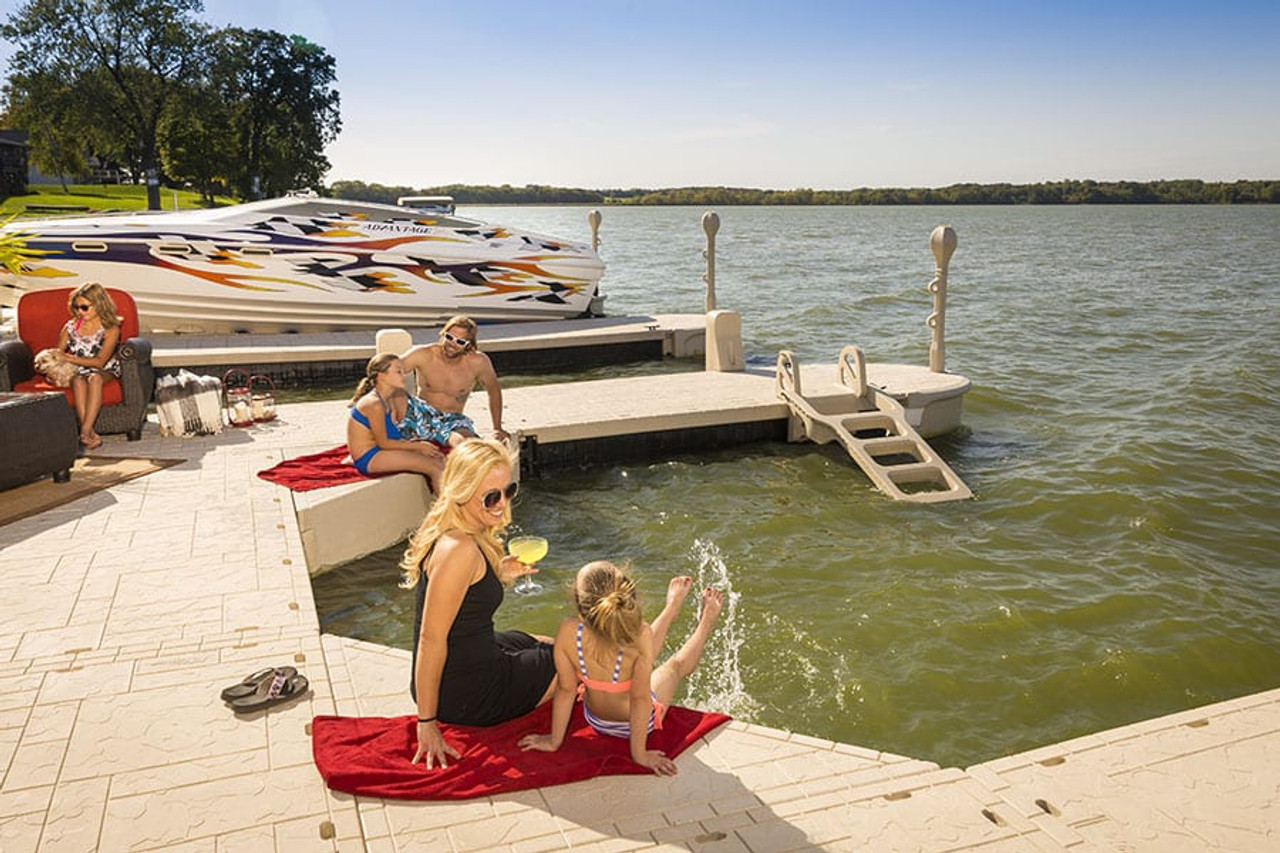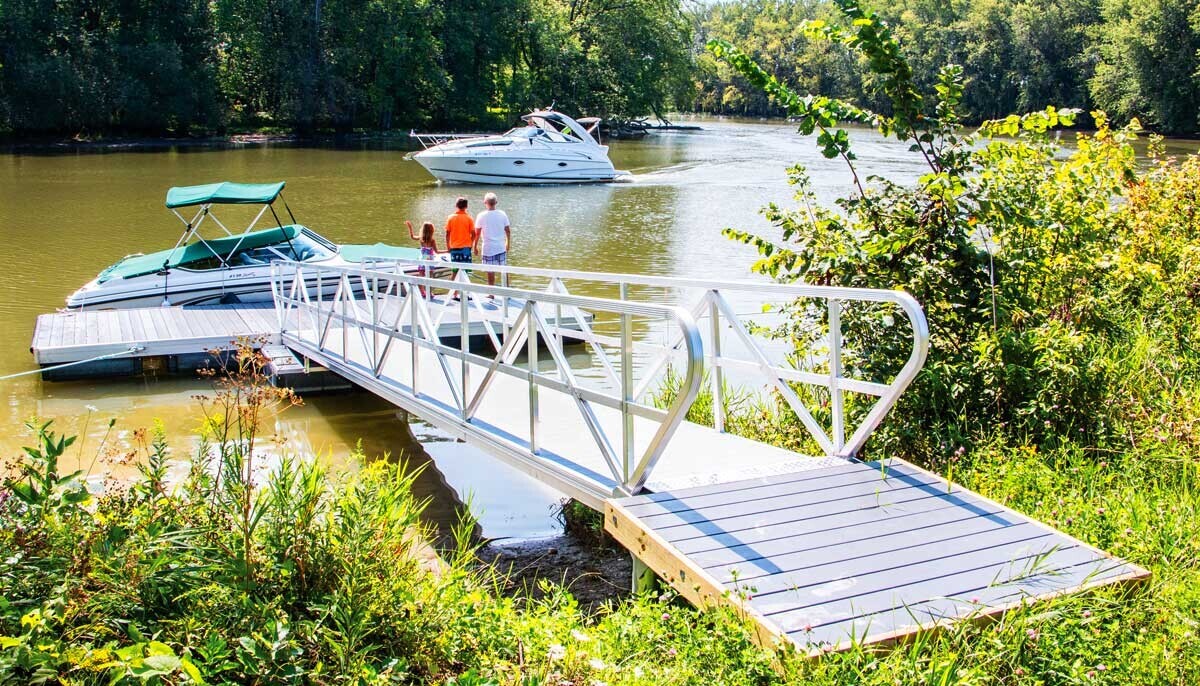Browsing the Options: Choosing the Right Dock Company for Your Floating Dock Task
Browsing the Options: Choosing the Right Dock Company for Your Floating Dock Task
Blog Article
Floating Docks: The Suitable Option for Versatile Water Access
Floating docks present an engaging service for a selection of water accessibility requires, using convenience that transcends conventional mooring choices. The modular nature of floating docks facilitates personalization, catering to certain requirements.
Advantages of Floating Docks
Floating docks offer various benefits that improve water gain access to for various applications. Their capacity to climb and fall with changing water degrees makes them particularly advantageous in settings with varying trends or seasonal variations. This adaptability makes certain that vessels can quickly moor without worry for the water's depth, giving a trusted platform for leisure, commercial, and commercial uses.
Additionally, floating docks are typically created from resilient products that stand up to corrosion, making them appropriate for lasting use in marine atmospheres. Their installment is generally less intrusive than traditional fixed docks, lowering the ecological impact and assisting in quicker release (floating dock company). This flexibility permits for easier moving or reconfiguration according to individual requirements or ecological changes
Security is another essential benefit; floating docks can give secure gain access to for people getting off or boarding from watercrafts and lower the threat of mishaps connected with unstable surfaces. They can be created to fit a range of accessories, such as fenders and cleats, boosting functionality. On the whole, floating docks stand for a reliable option for enhancing water access throughout diverse sectors while advertising security and environmental sustainability.

Sorts Of Floating Docks
Numerous kinds of floating docks deal with different requirements and environments, each developed with details features to maximize functionality. The most typical kinds include modular docks, which contain interlocking sections that permit simple personalization and development. These docks are optimal for entertainment use, as they can be tailored to fit different boat dimensions and water problems.
Another prominent alternative is the fixed floating dock, which remains secured in position but floats with altering water degrees. floating dock company. This kind is specifically fit for locations with minimal tidal changes, supplying secure access for fishing or swimming. Additionally, there are drive-on docks, which feature a sloped style that enables watercrafts to conveniently drive on and off, making them ideal for individual watercraft and smaller vessels
For industrial applications, durable floating docks are offered, built from reinforced products to hold up against considerable tons and harsh marine settings. Last but not least, environment-friendly floating docks make use of lasting products and layouts to decrease ecological effect, often integrating attributes like plant life to support neighborhood wildlife. Understanding the various kinds of floating docks ensures that users can pick one of the most suitable service for their specific needs.
Installment Process Overview
An effective setup of floating docks needs careful preparation and interest to detail to ensure optimum efficiency and security. The initial action includes evaluating the website conditions, consisting of water depth, current, and prospective obstacles. This assessment educates the selection of the ideal dock products and design tailored to the details atmosphere.
Next, acquiring required licenses is important, as numerous jurisdictions have policies relating to building on water bodies. As soon as authorizations are safeguarded, the installment can proceed. Begin by preparing the foundation, which might involve anchoring systems or pilings customized to the dock type and regional problems.
Following the foundation setup, construct the dock areas according to manufacturer specifications. Make certain that all elements are securely secured and straightened to endure environmental stress and anxieties. Position the dock in the assigned location, guaranteeing it is degree and stable.

Upkeep Tips and Finest Practices
After the go to my blog setup process is full, ongoing maintenance plays an important function in making certain the durability and performance of floating docks. Normal examinations must be performed to recognize any indicators of damage, damage, or wear - floating docks. Examine for any kind of wikipedia reference loose installations, fractures, or separation in the dock areas, as these can compromise architectural stability
Cleaning the dock is essential to get rid of debris, algae, and various other build-up that can influence its appearance and safety. Make use of a gentle stress laundry periodically to keep tidiness without creating damage to the surface area. In addition, using a protective sealer every few years can aid improve long life and withstand ecological wear.
Focus on the mooring lines and supports, ensuring they are cost-free and safe from corrosion. Replace any kind of degraded components immediately to avoid dangers. Seasonal changes may additionally be required; throughout extreme climate condition, repositioning or enhancing the dock can stop damage.
Applications for Floating Docks
Floating docks offer a wide range of applications, accommodating both leisure and commercial requirements. In leisure setups, they offer smooth access to waterways for activities such as boating, fishing, and swimming. Their adjustable nature enables installation in varying water levels, making sure stable and risk-free gain access to despite tidal fluctuations.
Readily, floating docks are crucial for marinas and waterfront services. They promote the docking of vessels, allowing efficient unloading and filling of products. Their modular layout enables easy growth or reconfiguration to fit changing organization demands, making them perfect for watercraft leasings, trip procedures, or angling charters.
Furthermore, floating docks are used in environmental applications such as aquatic research and environment restoration. They can work as systems for clinical research studies, keeping an eye on water high quality, or conducting wildlife studies without troubling sensitive communities.
In industrial contexts, floating docks are employed in building and construction tasks, supplying access to hard-to-reach areas for tools and workers. Their flexibility, sturdiness, and very little influence on the setting make them an ideal choice for a variety of applications, improving both functionality and accessibility in numerous water-based atmospheres.
Conclusion
In final thought, floating docks represent an ideal option for varied water access needs, owing to their flexibility, resilience, and modular style. Floating docks offer as a valuable property for recreational, commercial, and environmental jobs, making certain dependable accessibility to waterways and promoting sustainable practices in water settings.
Floating docks present an engaging service for a variety of water gain access to needs, providing flexibility that transcends traditional mooring options.Floating docks deal various advantages that enhance water gain access to for numerous applications. On the whole, floating docks stand for a reliable remedy for improving water access across diverse markets while promoting safety and security and ecological sustainability.
Another preferred alternative is the fixed floating dock, go to the website which stays anchored in location however drifts with altering water levels.In verdict, floating docks represent an optimal option for varied water gain access to needs, owing to their versatility, resilience, and modular design.
Report this page